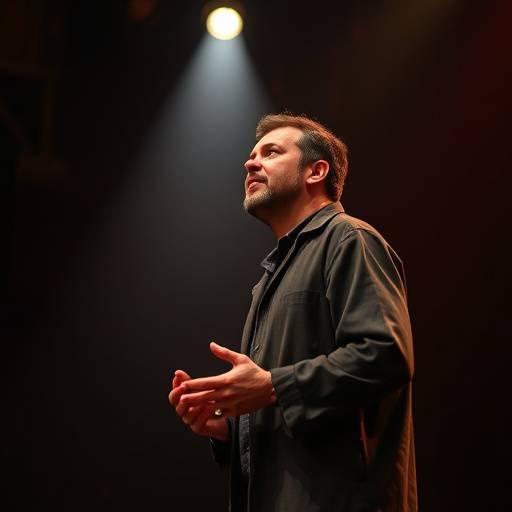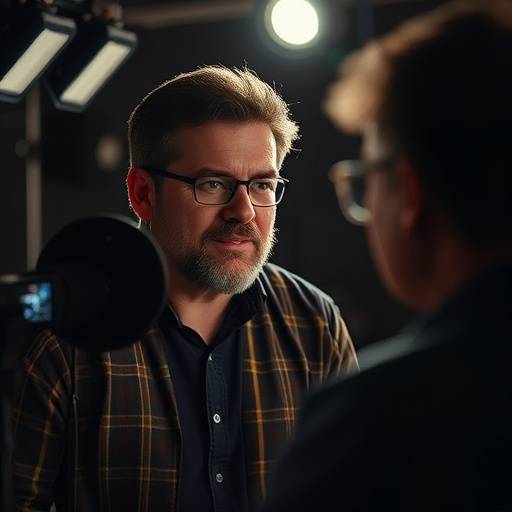The Power of Improvisation: Thinking on Your Feet
Published on October 26, 2024 by Anya Petrova

Improvisation, or "improv," is a cornerstone of an actor's training, and its benefits extend far beyond the stage or screen. It's about more than just being funny; it's about developing spontaneity, quick thinking, and the ability to connect with your scene partners in a meaningful way. At Thespian Arts Academy, we emphasize improvisation as a crucial skill for all our students, regardless of their chosen path within the performing arts.
One of the most significant advantages of improv is its ability to unlock creativity. When you're forced to create a scene on the spot, without a script, you tap into a different part of your brain. You learn to trust your instincts and embrace the unexpected. This can be incredibly liberating and can help you overcome the fear of making mistakes – a common hurdle for many aspiring actors.
Furthermore, improv enhances your listening skills. In an improv scene, you must be fully present and attentive to what your scene partner is saying and doing. You need to build on their ideas and contribute to the story in a way that makes sense. This level of active listening is essential for any actor, whether they're performing Shakespeare or a modern-day drama.
Here are a few improv exercises you can try at home:
-
"Yes, and..."
This classic exercise involves accepting whatever your scene partner says and adding to it. For example, if your partner says, "It's a beautiful day for a picnic," you might respond with, "Yes, and I've packed all your favorite sandwiches."
-
"One-Word Story."
Gather a group of friends and create a story one word at a time. This forces you to listen carefully and contribute in a way that moves the narrative forward.
-
"Character Swap."
Start a scene with a defined character and then switch characters mid-scene. This challenges you to think on your feet and adapt to new circumstances.
Improv isn't just for comedic actors. It's a valuable tool for anyone who wants to improve their communication skills, boost their confidence, and unlock their creative potential. At Thespian Arts Academy, we believe that improv is an essential part of a well-rounded acting education, and we encourage all our students to embrace its challenges and reap its rewards. Consider joining our next Improvisation class and discover the power within!
 Written by Anya Petrova, Thespian Arts Academy Instructor
Written by Anya Petrova, Thespian Arts Academy Instructor
Mastering the Monologue: Tips for Audition Success
Published on October 19, 2024 by David Chen

The monologue is a staple of the audition process for actors. It's your opportunity to showcase your talent, range, and understanding of character in a concise and impactful way. But choosing the right monologue and delivering it effectively can be daunting. Here are some tips from the faculty at Thespian Arts Academy to help you master the art of the monologue and nail your next audition.
1. Choose Wisely.
The most crucial step is selecting a monologue that suits you. It should be age-appropriate, within your range, and something you connect with personally. Avoid overdone monologues or those that are too similar to roles you've already played. Look for something fresh and challenging that allows you to showcase your unique strengths.
2. Know Your Character.
Don't just memorize the words; understand the character's motivations, relationships, and circumstances. Do your research on the play or film from which the monologue is taken. The more you know about the character, the more authentic your performance will be.
3. Focus on the Objective.
Every monologue has a clear objective. What does the character want to achieve? Who are they talking to? Answering these questions will give your performance focus and direction.
4. Find the Stakes.
What will happen if the character doesn't achieve their objective? The higher the stakes, the more compelling your performance will be. Make sure you clearly understand what's at risk for the character.
5. Practice, Practice, Practice.
Rehearse your monologue until it feels natural and comfortable. But don't over-rehearse to the point where it becomes stale. Leave room for spontaneity and discovery in each performance.
6. Make Strong Choices.
Auditions are your chance to make bold artistic choices. Don't be afraid to take risks and try something different. Casting directors are looking for actors who are confident, creative, and willing to bring their own unique perspective to the role.
7. Connect with the Reader.
Even though you're delivering a monologue, you're still communicating with someone. Focus on connecting with the reader and making them believe that you're truly talking to someone.
8. Be Prepared for Feedback.
Be open to feedback from casting directors and directors. They may offer suggestions that can help you improve your performance. Remember, the audition is a learning experience, and every audition is an opportunity to grow as an actor.
9. Dress Appropriately.
Wear clothing that is comfortable and allows you to move freely. Avoid anything that is too distracting or revealing. Your focus should be on your performance, not your wardrobe.
10. Relax and Have Fun.
Auditions can be stressful, but it's important to relax and have fun. Remember, you're doing what you love. Enjoy the opportunity to share your talent with others.
By following these tips, you can master the art of the monologue and increase your chances of audition success. The Thespian Arts Academy offers specialized workshops in monologue preparation.
Check our courses
and sign up for the next session!
 Written by David Chen, Thespian Arts Academy Alumnus
Written by David Chen, Thespian Arts Academy Alumnus
The Importance of Vocal Training for Actors
Published on October 12, 2024 by Eleanor Vance

As actors, we often focus on the external aspects of performance – physicality, emotion, and characterization. However, one of the most crucial yet sometimes overlooked elements is our voice. Vocal training is an indispensable part of an actor's toolkit, enabling them to communicate effectively, project their voice, and embody diverse characters. At Thespian Arts Academy, we consider vocal training as vital as scene study or movement, ensuring our students are equipped with a powerful and versatile instrument – their voice.
Effective vocal training does more than simply making your voice louder. It helps you develop control over your pitch, tone, and resonance, allowing you to convey a wide range of emotions and intentions. Imagine playing a regal queen with a raspy, weak voice, or a timid child with a booming voice. Vocal training helps you fine-tune your instrument to fit the character and the context.
Proper breath control is a cornerstone of vocal technique. It provides the necessary power to project your voice without strain. Actors who master breath control can sustain long phrases, maintain clarity, and avoid vocal fatigue. Diaphragmatic breathing, a technique often taught in vocal training, ensures that you're using your lungs efficiently and supporting your voice from your core.
Articulation and diction are also essential components of vocal training. Clear articulation ensures that your words are easily understood by the audience, regardless of their location in the theatre or their native language. Diction exercises help you refine your pronunciation and eliminate any speech impediments that might hinder your performance.
Here are some practical tips for improving your vocal technique:
-
Warm-up Exercises:
Before each performance or rehearsal, perform vocal warm-ups to prepare your voice. These can include humming, lip trills, and tongue twisters.
-
Posture:
Maintain good posture to support your breath and allow your vocal cords to vibrate freely.
-
Hydration:
Drink plenty of water to keep your vocal cords lubricated.
-
Vocal Rest:
Avoid straining your voice unnecessarily. Take breaks when you need them and avoid shouting or yelling.
Thespian Arts Academy offers a dedicated Voice and Diction course designed to help actors unlock the full potential of their voice. In this course, you'll learn about vocal anatomy, breathing techniques, articulation exercises, and character voice development. You'll also receive personalized feedback from experienced vocal coaches who will help you identify and address any vocal challenges you may face. We also offer one-on-one sessions with voice coaches like Mr. Charles Bingley. Contact
the Academy
for contact information and scheduling.
Vocal training is an investment in your future as an actor. It's a skill that will serve you well throughout your career, enabling you to tackle challenging roles, connect with audiences, and deliver unforgettable performances. Whether you're a seasoned professional or a novice actor, vocal training can help you take your craft to the next level.
 Written by Eleanor Vance, Founder and Director of Thespian Arts Academy
Written by Eleanor Vance, Founder and Director of Thespian Arts Academy






